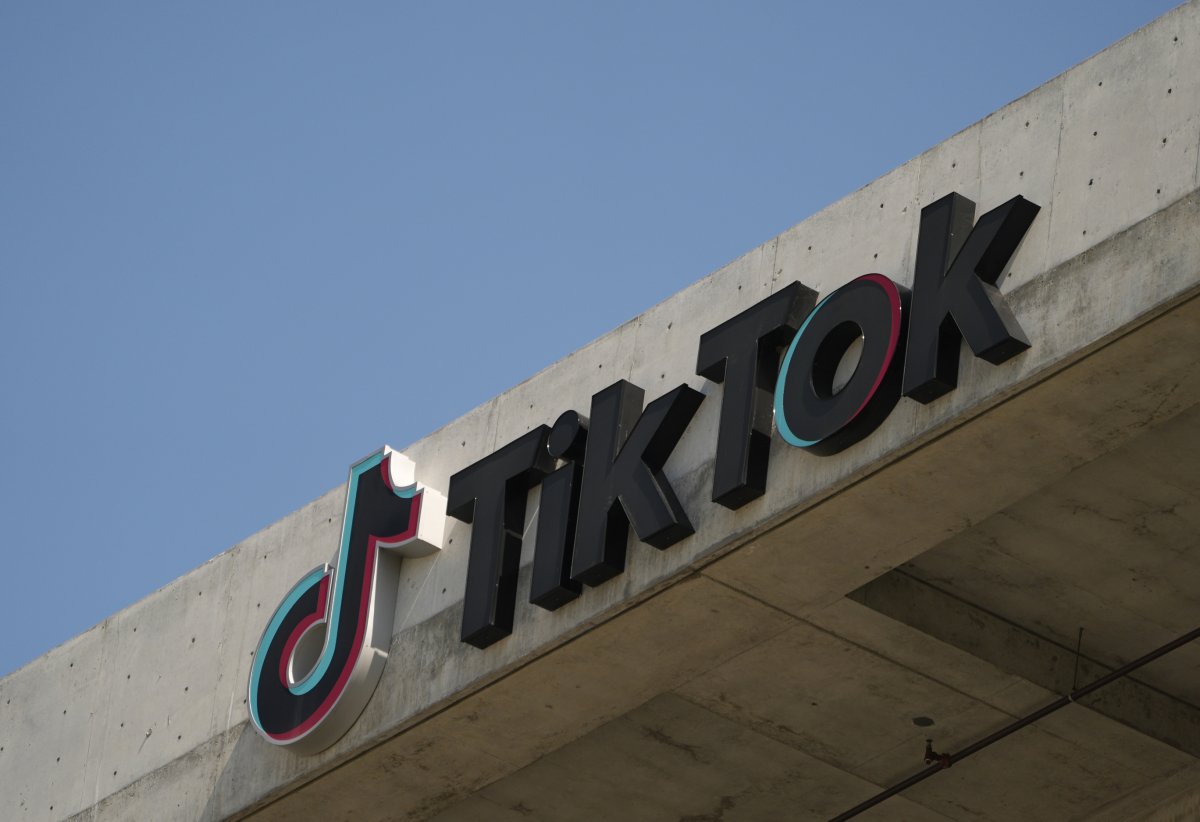Thirteen states and the District of Columbia on Tuesday filed lawsuits against TikTok, accusing the video app of making its platform addictive to young people and thus harming youth mental health.
The lawsuits follow an investigation into TikTok that was conducted by a group of state attorneys general. Along with D.C., California, Illinois, Kentucky, Louisiana, Massachusetts, Mississippi, New Jersey, New York, North Carolina, Oregon, South Carolina, Vermont and Washington state sued the Chinese-owned app.
The lawsuits take issue with the TikTok algorithm, which creates the app’s main feed by tailoring content to users’ interests. The states’ lawsuits also highlight design features that allegedly make the platform addictive for children, such as the endless scrolling capability, push notifications with built-in “buzzes” and face filters that can allegedly cause body image issues.
Newsweek reached out to TikTok via email on Tuesday for comment.

The TikTok logo is seen on their building in Culver City, California, on March 11, 2024. Thirteen states and the District of Columbia filed lawsuits against TikTok on Tuesday.
AP Photo/Damian Dovarganes
The District of Columbia’s legal filing said the “dopamine-inducing” algorhyhm is designated to be addictive in order to keep young users on the app for prolonged periods of time.
“It is profiting off the fact that it’s addicting young people to its platform,” District of Columbia Attorney General Brian Schwalb said in an interview with The Associated Press.
Schwalb said TikTok generates its ad revenue by keeping users engaged, “but unfortunately, that’s also how they generate adverse mental health impacts on the users.”
In a statement, California Attorney General Rob Bonta said that “TikTok intentionally targets children because they know kids do not yet have the defenses or capacity to create healthy boundaries around addictive content.”
New York Attorney General Letitia James also released a statement about her state’s lawsuit. She said, in part: “Young people are struggling with their mental health because of addictive social media platforms like TikTok.”
While TikTok doesn’t allow users under the age of 13 to sign up for its main service and restricts content for minors, several states said in their lawsuits that children can still bypass these restrictions.
In a statement to Newsweek, a TikTok spokesperson said, “We strongly disagree with these claims, many of which we believe to be inaccurate and misleading.”
“We’re proud of and remain deeply committed to the work we’ve done to protect teens and we will continue to update and improve our product,” the statement continued. “We provide robust safeguards, proactively remove suspected underage users, and have voluntarily launched safety features such as default screen time limits, family pairing, and privacy by default for minors under 16. We’ve endeavored to work with the Attorneys General for over two years, and it is incredibly disappointing they have taken this step rather than work with us on constructive solutions to industrywide challenges.”
TikTok and parent company ByteDance are also currently challenging federal legislation that President Joe Biden signed into law in April. The law could result in TikTok being banned in the U.S. in January if ByteDance doesn’t sell the app.
Meanwhile, the U.S. Department of Justice (DOJ) sued TikTok in August for allegedly not protecting children’s privacy. In its lawsuit, the DOJ said ByteDance ran afoul of a federal law that requires apps geared towards young people to get parental consent before collecting personal information of kids under 13.
The DOJ complaint “also says the companies failed to honor requests from parents who wanted their children’s accounts deleted, and chose not to delete accounts even when the firms knew they belonged to kids under 13,” the AP reported.
A TikTok spokesperson previously responded to the DOJ lawsuit in a statement to Newsweek by saying the allegations “relate to past events and practices that are factually inaccurate or have been addressed.”
“We are proud of our efforts to protect children, and we will continue to update and improve the platform,” the statement said. “To that end, we offer age-appropriate experiences with stringent safeguards, proactively remove suspected underage users, and have voluntarily launched features such as default screentime limits, Family Pairing, and additional privacy protections for minors.”
Update 10/08/24 11:55 a.m. ET: This story has been updated to include a statement from a TikTok spokesperson.




